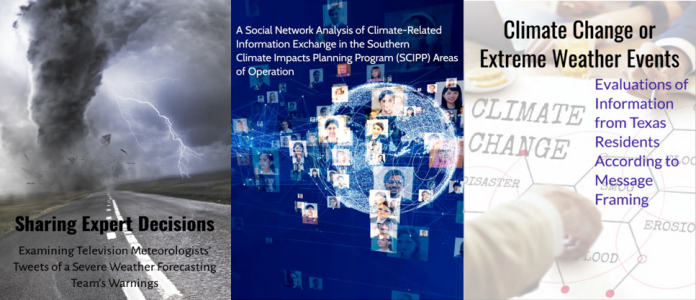Dr. William Howe, SCIPP Climate Assessment Specialist, led three studies that focused on various aspects of climate change and severe weather communication. Recently, three reports were produced. They are summarized below.

REPORT #1 (July 2020):
In Sharing Expert Decisions: Examining Television Meteorologists’ Tweets of a Severe Weather Forecasting Team’s Warnings, Dr. Howe and co-author Dr. Miranda McLouglin, from Texas Christian University, compared tweets of severe weather events between the National Weather Service (NWS) and local television stations to better understand how media outlets deliver severe weather messages to the public. They analyzed each severe tweet finding significant differences on measures of clout, analytical thinking, and positive emotions. Results showed that while the NWS and television weather outlets held the strongest ability to set the agenda for severe weather messages, they themselves were affected by agenda setting, depicted in the tone and content of the weather messages. The results of this study illustrate why future researchers should approach media studies differentially based on the outlet’s vulnerability to agenda setting.
REPORT #2 (October 2020):
In his second study, A Social Network Analysis of Climate-Related Information Exchange in the Southern Climate Impacts Planning Program (SCIPP) Areas of Operation, Dr. Howe examined the relationships between SCIPP’s primary
stakeholders and sources of climate information. He examined familiarity with specific sources, such as the National Climate Assessment, U.S. Climate Resilience Toolkit, and NCEI/AMS State of the Climate Report, along with
familiarity of climate information providers, such as SCIPP, the USGS South Central Climate Adaptation Science Center, NOAA Southern Regional Climate Center, and local NOAA National Weather Service Forecast Offices. The analysis identified 81 unique organizations, 130 unique connections, and eight distinct groups. The study shows a need for more accessible information to stakeholders and suggests that SCIPP provide more timely updates to increase the relevance of its information. Furthermore, results highlight the critical role of sustained assessment specialists in cultivating stronger relationships, particularly in two areas of focus: universities and underrepresented populations.
REPORT #3 (July 2020):
In his third study, Climate Change or Extreme Weather Events: Evaluations of Information from Texas Residents According to Message Framing and Source Credibility, Dr. Howe conducted an experiment in which messages were framed differently to see how residents of Texas responded. He found that messages framed as extreme weather events instead of climate change, and messages from federal government sources versus non-profits, were perceived as more credible. The study also found that those with conservative political ideology rated all messages lower on credibility and newsworthiness and that older participants did not find messages to be as newsworthy as younger participants.
